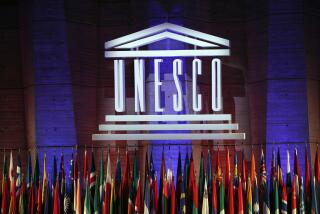Rights Talks in Moscow Get Reagan’s OK
- Share via
WASHINGTON — President Reagan has approved U.S. participation in a controversial international conference on human rights to be held in Moscow in 1991, thus eliminating the last major roadblock to a new set of East-West arms negotiations, Administration officials said Tuesday.
Reagan’s decision came at the recommendation of Secretary of State George P. Shultz, who is expected to take part later this month in issuing an East-West declaration in Vienna authorizing the Moscow conference and proclaiming an enhanced list of internationally accepted freedoms.
U.S. agreement to hold a human rights conference in the Soviet capital would represent the Reagan Administration’s strongest endorsement yet of Soviet President Mikhail S. Gorbachev’s internal reforms. Some human rights groups strongly disapprove of U.S. participation.
Approval of the Vienna declaration by the 35 nations that have been working on it for two years is expected to lead to convening much-awaited East-West negotiations early this year on phased reductions of the massive armies that have faced each other in Europe since the onset of the Cold War four decades ago.
Administration officials said President-elect George Bush and his designated secretary of state and national security adviser, James A. Baker III and Brent Scowcroft, were consulted in advance. Reagan’s decision is scheduled to be announced by the White House in Los Angeles this morning.
An official said that Bush was consulted at “every step in the process” and is fully behind the decision, which includes conditions on Soviet conduct that would allow the new President to reverse course before 1991 if the Soviets backtrack.
DeConcini Declined
Sen. Dennis DeConcini (D-Ariz.), co-chairman of the U.S. Commission on Security and Cooperation in Europe, said through a spokesman that Shultz telephoned him Tuesday seeking his concurrence with the decision to approve the Moscow conference but that he declined. DeConcini’s view is that about 80 more long-term refuseniks who have been seeking to emigrate from the Soviet Union should be allowed to leave before the United States accepts the Moscow conference, his spokesman said.
A number of U.S. human rights groups are also expected to protest the Administration’s position, on grounds that the Soviets should be required to take additional actions on outstanding human rights cases before the West agrees to participate in the Moscow conference.
The State Department, in a statement read Friday by spokeswoman Phyllis Oakley, set the stage for Shultz’s recommendation and Reagan’s decision by declaring that “the Soviet Union has taken a number of significant, positive actions on human rights in recent months.”
Oakley mentioned the release of more than 600 political prisoners in the past two years, including all Helsinki-process human rights “monitors” who were being held and “all prisoners known to us who were charged under political or religious articles of the Soviet criminal code.”
She also cited the settlement of all but about a dozen U.S.-Soviet family-reunification cases, a sharp increase in Jewish, Armenian, German and Pentecostal emigration from the Soviet Union, permission for many long-term refuseniks to emigrate, cessation of Soviet and Eastern European jamming of Western radio broadcasts and commitments by Gorbachev to make extensive changes in Soviet laws and regulations on human rights.
U.S. Conditions
Just such Soviet moves were listed by Shultz in an early November letter to Soviet Foreign Minister Eduard A. Shevardnadze setting out U.S. conditions for participation in the Moscow conference.
The Shultz letter had the general approval of the British and Canadian governments, which had been nearly as reluctant as Washington to send diplomats to a rights meeting held by the Soviets in Moscow.
Shevardnadze proposed a Moscow conference on human rights in his opening statement to the Vienna negotiations two years ago. And in recent months the Soviets emphasized the demand for such a meeting.
Besides providing international recognition to its recent steps to improve human rights at home, conditional Western approval of such a conference could be used by Gorbachev as a lever for further reforms in his internal maneuvering with Communist Party conservatives and police agencies, according to U.S. and some Soviet officials.
In Vienna on Tuesday, nine neutral or nonaligned nations presented a nearly complete draft of the declaration proposed to be proclaimed by Shultz, Shevardnadze and others in Jan. 17-19 ceremonies winding up the Vienna Conference on Security and Cooperation in Europe, a follow-up meeting on the 1975 Helsinki accords.
U.S. sources said the draft calls for greatly enhanced freedoms for Soviet Bloc citizens to travel; emigrate; circulate and receive information; practice religion, and reunite with relatives in the West.
More to Read
Sign up for Essential California
The most important California stories and recommendations in your inbox every morning.
You may occasionally receive promotional content from the Los Angeles Times.













